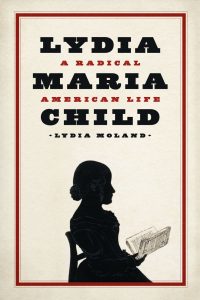Read an Excerpt from “Lydia Maria Child: A Radical American Life” by Lydia Moland
In Lydia Maria Child: A Radical American Life professor Lydia Moland offers a compelling and personal biography of one of nineteenth-century America’s most courageous abolitionists. By 1830, Child had established herself as something almost unheard of in the American nineteenth century: a beloved and self-sufficient female author, best known for spunky self-help books and charming children’s stories. But in 1833, Child shocked her readers by publishing the first book-length argument against slavery in the United States. An Appeal in Favor of that Class of Americans Called Africans was so radical in its commitment to abolition that Child’s friends abandoned her, patrons ostracized her, and her book sales plummeted. This excerpt from Lydia Maria Child: A Radical American Life imagines the reactions to Child’s book—and reminds us of the untold numbers Child drew to the abolitionist cause.
I imagine a genteel Boston dinner party at which Convers Francis, Child’s beloved brother, is asked awkward questions about his sister’s new book. He answers as best he can. He returns home to his vast library, now among the largest in greater Boston, paralyzed by soul-searching. Had he indeed gone wrong in cultivating a young girl’s intellect, just as his parents had worried? What harm had he unleashed on the world by lending his little sister Milton and Shakespeare? He wrote her a letter, which is now lost. But Child’s response conjures its admonishing tone. “You ask me to be prudent, and I will be so,” she concedes. But, she quickly warns, it is too late for “what the world calls prudent.” “I have examined the cause of the slave too thoroughly, and felt his wrongs too deeply, to be prudent in the worldly sense of the term,” she wrote. I imagine Convers Francis reading the letter, then closing his eyes, head in his hands.
I imagine tearful children being told they will no longer be receiving the Juvenile Miscellany, since their beloved Aunt Maria had turned out to be a dangerous radical. But while their less tolerant parents were not looking—trusting perhaps too easily in a familiar author—the damage had been done. “I well remember,” an early reader of the Miscellany wrote to Child decades later, “the zeal with which it was circulated, by a little group of schoolgirl abolitionists, of which I had the honor to be one.” We can only imagine what rippling effect those schoolgirls had on their society as they grew to adulthood and raised children of their own. Other effects of Child’s efforts we do not need to conjecture. Thomas Wentworth Higginson, one of the financers of John Brown’s bloody abolitionist insurrection twenty-five years later, gave Child credit for his youthful conversion to antislavery work. Massachusetts senator Charles Sumner, too, cited Child’s influence in starting him down the road of passionate abolitionism that would lead, decades later, to his being beaten unconscious on the Senate floor.
And what of the proud Bostonian who refused to read the Appeal, fearing it would make him an abolitionist? He was a respected colonizationist minister whose income depended on keeping his wealthy congregation happy. His wife and daughter had been converted by Child’s arguments. I imagine them emboldened by the Appeal’s female author. I envision the minister harried by antislavery arguments as he sat at dinner, pursued by evidence of racial equality as he tried to escape to his bedchamber.
How many more people among Boston’s polite society sat at dinner parties, hearing their hosts rage at Mrs. Child’s audacity, wondering to themselves whether she was right? Among the outraged parents who canceled their subscriptions to the Juvenile Miscellany, how many had second thoughts? How many hearts were softened and minds awakened, so that when an opportunity for action materialized, people were ready? We will never know, and Child never did either. But people do not throw ineffective books out of windows with tongs.

Lydia Moland is professor of philosophy at Colby College. Her scholarship in German philosophy, including Hegel’s Aesthetics: The Art of Idealism, has been supported by the National Endowment for the Humanities, the ACLS, and the American Academy in Berlin. Her work on Lydia Maria Child has appeared in the Paris Review, the Boston Globe, the Washington Post, and on National Public Radio.
Lydia Maria Child is available now from our website or your favorite bookseller.
